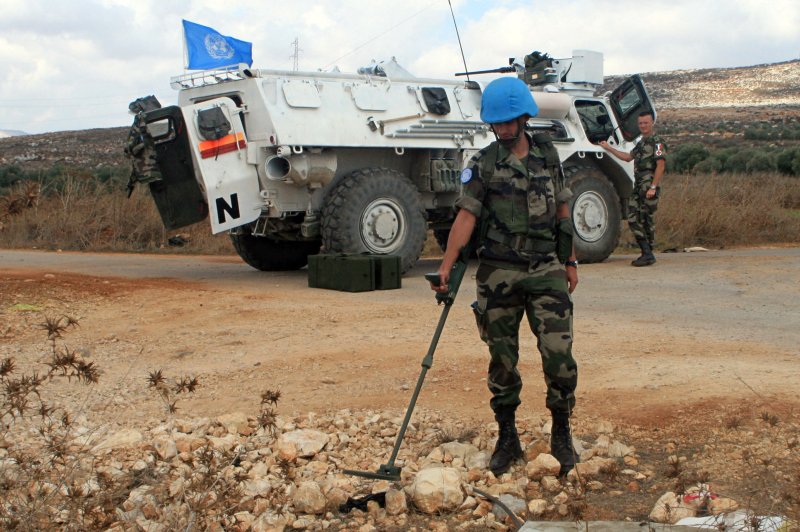On This Day: Cluster bomb ban goes into effect
On August 1, 2010, a worldwide ban on cluster bombs went into effect.
U.S. won't stop using cluster bombs by 2019 deadline
By UPI Staff

Airman David Rodriguez (R) prepares cluster bombs aboard the aircraft carrier USS Independence on February 12, 1998. On August 1, 2010, a worldwide ban on cluster bombs went into effect. File Photo by Felix Garza/U.S. Navy | License Photo
U.S. won't stop using cluster bombs by 2019 deadline

Airman David Rodriguez (R) prepares cluster bombs aboard the aircraft carrier USS Independence on February 12, 1998. On August 1, 2010, a worldwide ban on cluster bombs went into effect. File Photo by Felix Garza/U.S. Navy | License Photo
U.S. won't stop using cluster bombs by 2019 deadline
OR SELLING THEM
NOV. 30, 2017

French U.N. peacekeepers look for unexploded cluster bombs on the side of the road near the south Lebanese village of Blat on September 29, 2006. The Pentagon on Thursday said it's delaying its plan to stop using cluster bombs by the beginning of 2019. UPI File Photo | License Photo
Nov. 30 (UPI) -- The Pentagon announced Thursday it is postponing plans to end its use of cluster munitions in 2019.
In 2008, the George W. Bush administration had set a timeline in place that the United States would stop using unsafe cluster bombs -- ones that did not meet a standard of failing to detonate 1 percent of the time or less -- by Jan. 1, 2019.
The policy was in reaction to the 2008 Convention on Cluster Munitions, an international treaty signed by more than 100 countries to ban the use, sale or stockpile of the weapon. Cluster bombs face criticism because parts of the weapon can scatter and detonate at a later time, sometimes after years.
The United States didn't sign the treaty but instead instituted the 2019 deadline.
Pentagon spokesman Tom Crossen said the Trump administration determined it won't stop using cluster bombs that meet the failure rate threshold because there are no bombs on the market that meet that standard.
"The Department of Defense has determined that cluster munitions remain a vital military capability in the tougher warfighting environment ahead of us, while still a relatively safe one," he said in a statement.
The Hill reported that though the U.S. military rarely uses cluster munitions, it does sell them to other countries and they could be useful in larger ground wars.

French U.N. peacekeepers look for unexploded cluster bombs on the side of the road near the south Lebanese village of Blat on September 29, 2006. The Pentagon on Thursday said it's delaying its plan to stop using cluster bombs by the beginning of 2019. UPI File Photo | License Photo
Nov. 30 (UPI) -- The Pentagon announced Thursday it is postponing plans to end its use of cluster munitions in 2019.
In 2008, the George W. Bush administration had set a timeline in place that the United States would stop using unsafe cluster bombs -- ones that did not meet a standard of failing to detonate 1 percent of the time or less -- by Jan. 1, 2019.
The policy was in reaction to the 2008 Convention on Cluster Munitions, an international treaty signed by more than 100 countries to ban the use, sale or stockpile of the weapon. Cluster bombs face criticism because parts of the weapon can scatter and detonate at a later time, sometimes after years.
The United States didn't sign the treaty but instead instituted the 2019 deadline.
Pentagon spokesman Tom Crossen said the Trump administration determined it won't stop using cluster bombs that meet the failure rate threshold because there are no bombs on the market that meet that standard.
"The Department of Defense has determined that cluster munitions remain a vital military capability in the tougher warfighting environment ahead of us, while still a relatively safe one," he said in a statement.
The Hill reported that though the U.S. military rarely uses cluster munitions, it does sell them to other countries and they could be useful in larger ground wars.
No comments:
Post a Comment